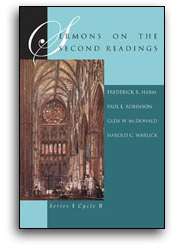SermonStudio
The Achilles' Heel Of The Church
Sermon
Sermons On The Second Readings
For Sundays In Advent, Christmas, And Epiphany
Have you ever noticed how prevalent is the number 3 in religious history? The children of Israel wander without water for three days under their leader Moses upon their freedom from bondage to the Egyptians. The nation later interprets the event to mean one should go no more than three days without reading the Torah.


